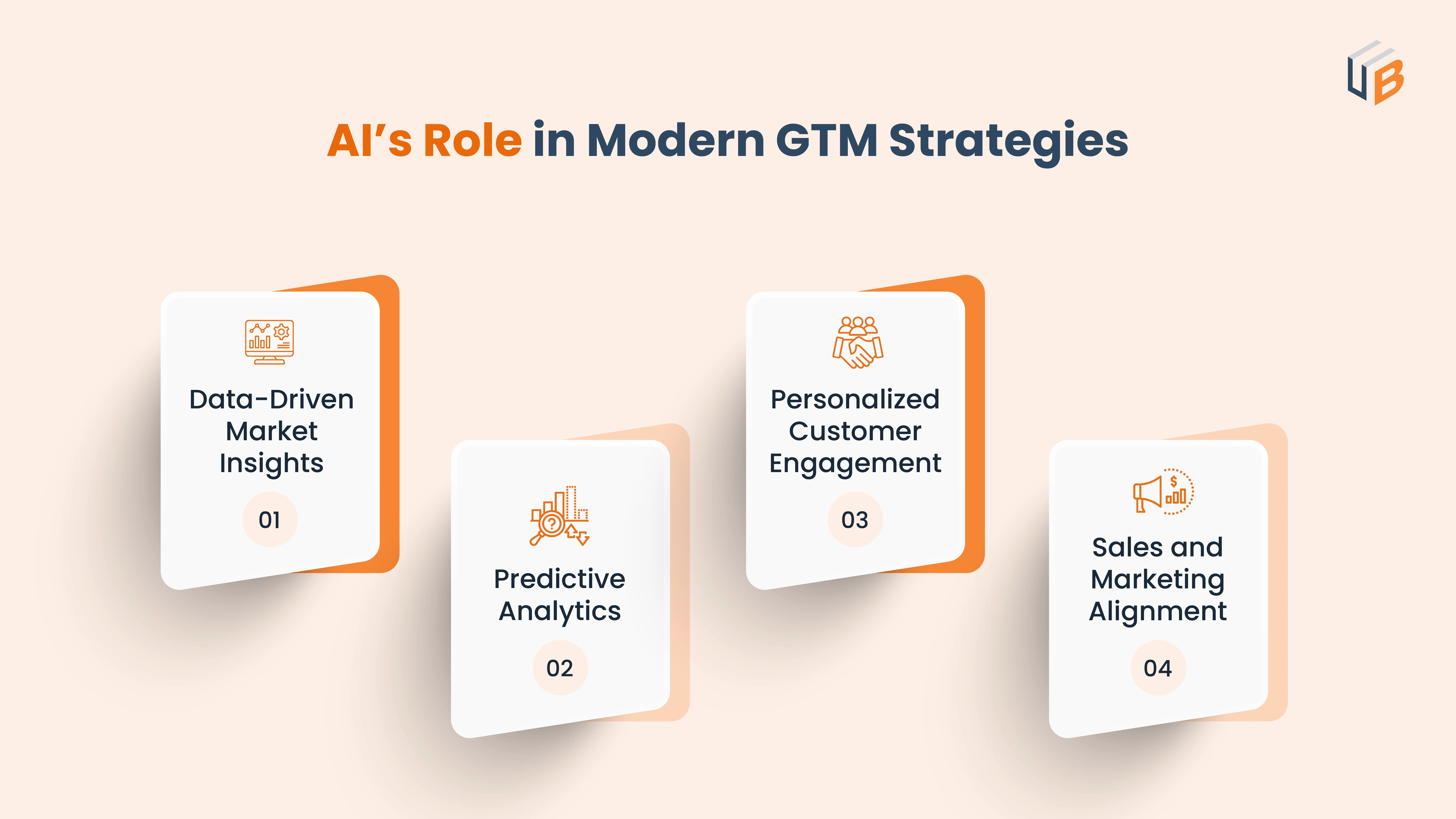
It is seen in the current business environment that SaaS companies do face increasing pressure to enter competitive markets swiftly and effectively.
In such scenarios, go-to-market (GTM) strategies play a pivotal role in achieving market success, but traditional methods often fall short in addressing the complexity and speed required to stay ahead. AI-powered GTM strategies prove to be a transformative approach that not only utilizes AI to refine market entry but also ensures engagement optimization and sustainable growth.
This blog explores how SaaS companies can use AI-driven insights to revolutionize their GTM strategies, overcome common challenges, and establish a competitive edge in even the most saturated markets.
AI’s Role in Modern GTM Strategies
Now, let’s talk about AI. Without a doubt, we all are familiar with the fact that AI has become an indispensable technology for modern businesses as it is reshaping the way companies approach market entry and engagement.

AI is indeed dynamic and has a functional role everywhere; let’s explore it in the context of GTM:
- Data-Driven Market Insights: Using AI, businesses can scrape large amounts of market data and understand trends and customer behavior to create a competitive advantage in the market. It enables the identification of target segments and opportunity prioritization.
- Predictive Analytics: Machine learning algorithms can be leveraged in the market to predict customer behavior and anticipate their needs. Additionally, they assist in forecasting trends and identifying potential revenue streams. These insights empower SaaS companies to take proactive measures, minimize risks, and make data-driven decisions.
- Personalized Customer Engagement: Customized interactions are enabled by AI-enabled tools such as AI chatbots and recommendation engines, boosting customer satisfaction and conversion.
- Sales and Marketing Alignment: It improves the alignment between sales and marketing teams by offering an integrated solutions of AI and automating most business processes. This alignment of strategy for entering the market and customer acquisition can be effective.
How SaaS Companies Can Enter Competitive Markets with Smarter Insights
SaaS companies often operate in dynamic and competitive markets where agility and precision are critical. AI-driven GTM insights provide the following advantages:
1. High-Potential Markets
Using AI tools, market data from multiple sources can be analyzed, including customer feedback, competitor performance, and industry reports. This analysis enables SaaS companies to identify high- potential markets and align their strategies accordingly.
For instance, AI platforms such as Tableau or Power BI can combine data from CRM systems, social media, and third-party databases to visualize market opportunities.
This means that companies can identify areas or sectors with untapped potential and thus direct their efforts towards them and allocate their resources properly.
2. Product-Market Fit
Continuous user feedback and usage patterns analysis through AI systems enhances product development by delivering critical understanding of how customers use products.
Through real-time data analytics, SaaS companies gain the ability to construct product enhancements swiftly, which align better with user demands. AI helps companies find user pain points while also recognizing unmet needs so they can enhance product features for better user experiences.
The achievement of powerful product-market fit in competitive industries becomes possible through the implementation of AI. For businesses in crowded markets, the key to success involves offering products that capture customer hearts because such products deliver standout performance and grow visibility.
SaaS businesses use smarter insights to tailor their products effectively while selecting those features that create lasting customer satisfaction and increased engagement. Through their proactive practices, these companies maintain leadership status in their space by preventing competitor advantages and retaining customers better than their competitors.
3. Pricing Strategies
AI-based pricing tools examine aspects such as competitor pricing, customers’ willingness to pay, and market demand elasticity. These insights enable SaaS companies to design the best pricing strategies that can help them generate the maximum revenue without scaring off potential customers.
4. Streamlining Customer Acquisition
Platforms like HubSpot and Marketo run successful hyper–targeted campaigns by ensuring that their marketing message resonates well with specific customer segments.
Another AI application such as predictive lead scoring helps sales teams to be more focused towards high-value prospects which leads to better conversion rates.
Platforms like HubSpot and Marketo leverage AI to run hyper-targeted campaigns by analyzing customer behavior, preferences, and engagement patterns. This ensures that marketing messages are precisely customized to resonate with specific customer segments, increasing engagement and conversion rates.
Similarly, AI-driven predictive lead scoring enables sales teams to prioritize high-value prospects by analyzing historical data, buying signals, and intent indicators. This not only improves efficiency but also focuses efforts directly on leads as it shortens sales cycles and enhances overall revenue growth.
5. Accelerating Sales Cycles
One can utilize AI tools to automate routine sales tasks such as CRM updates, follow-ups, and scheduling, allowing sales teams to focus more on closing deals. Moreover, it will enable SDRs to personalize their sales pitches based on buyer behavior, reducing the time needed to move prospects through the sales funnel.
To help you implement these AI-driven GTM strategies effectively, check out our GTM Cheatsheet below and download the full PDF for actionable insights!
Overcoming Common GTM Challenges with AI
Despite the benefits of AI-powered GTM strategies, SaaS companies often encounter challenges that hinder their market entry efforts. Here’s how AI addresses these issues:
1. Saturated Markets
With the market being extremely competitive, the key to conquer it is differentiation. In such scenarios, AI helps SaaS based companies in identifying the USPs by analyzing competitor strategies and customer pain points. Thus, it enables the creation of hyper personalized messages that resonate well with the target audience.
2. Managing Limited Resources
As we discuss startups and MSMEs, it is often seen that they operate with constrained budgets and teams. However, AI automation can help in the reduction of manual workloads associated with market research, lead generation, and customer support. It not only makes it easier but also allows teams to focus on strategic initiatives.
3. Data Overloaded
The sheer volume of data available today can be overwhelming. With the help of AI, teams can filter, process and analyze the data and later can provide insights that will lead to better decision- making.
For instance, Natural Language Processing (NLP) driven tools can extract sentiment and trends from customer reviews and social media mentions which will offer valuable input for GTM strategies.
4. Adapting to Rapid Market Changes
Markets can fluctuate anytime due to factors like economic shifts, technological advancements, or competitive actions. SaaS companies can harness AI’s ability to process vast amounts of data to adapt better to rapid changes in the market by creating strategies quickly. This will not only make them adaptive to the change but will also ensure they remain relevant and competitive.
Case Study: Salesforce’s Year-Over-Year (YOY) Growth Through AI-Powered GTM
Salesforce had to confront considerable issues while expanding market dominance among financial services and healthcare alongside its position as a global CRM leader. While new competitors entered the market regularly, Salesforce required both agility and data-driven approaches for its GTM strategy to sustain leadership dominance.
Challenge
The company needed to pinpoint unexploited business potential while solving specific problems that existed in these separate industrial sectors. A personalized, adaptive customer engagement approach served as a main priority to support market growth across these sectors since the company needed to prevent duplicative sales and marketing activities.
AI-Powered Solution
Salesforce leveraged its Einstein AI platform to redefine its GTM approach:
- Data-Driven Insights: The implementation of Einstein AI platforms allowed Salesforce to perform massive data analysis by collecting customer platform interactions with additional benchmark data across industries and emerging market trends. Salesforce’s team gathered business insights that led them to find lucrative areas of growth specifically within financial services and healthcare markets.
- Predictive Lead Scoring: Integration of machine learning models enables Salesforce to designate high-quality leads, which makes sales teams better focused on successful prospect interactions.
- Personalized Campaigns: The marketing teams at Salesforce used AI-driven insights to develop specialized marketing initiatives that targeted industry-specific challenges to increase both customer engagement and brand devotion.
- Churn Prediction: Einstein AI helps predict which customers are at risk of churn by analyzing usage patterns, engagement levels, and other key indicators. With these insights, Salesforce enables sales and customer success teams to take preventative measures to retain at-risk customers and increase overall lifetime value.
Results
The impact of AI-powered GTM strategies on Salesforce’s YOY growth was remarkable:
- Revenue Growth: The financial services and healthcare sectors contributed to a 15% annual increase in Salesforce’s revenue, exceeding what competitors could achieve.
- Improved Lead Conversion: Predictive scoring models improved the conversion rate by 20%, resulting in a dramatic reduction of sales cycle durations.
- Enhanced Customer Retention: The implementation of personalized engagement approaches across target industry verticals led to a 25% increase in the retention of customers.
Key Takeaway
The data demonstrates that when AI drives strategic deployment methods at Salesforce, its vertical-specific strategies enable the company to achieve sustainable business growth. Through AI applications for market data analysis and lead prioritization and customer interaction, SaaS firms can implement this model to discover fresh business opportunities and maintain competitive leadership.
Our blog
Latest blog posts
Tool and strategies modern teams need to help their companies grow.

Modern business success depends on more than just acquiring new customers because sus...

Generative AI in B2B marketing represents more than a passing trend because it active...

Personalization functions as the vital foundation for executing B2B marketing effecti...





